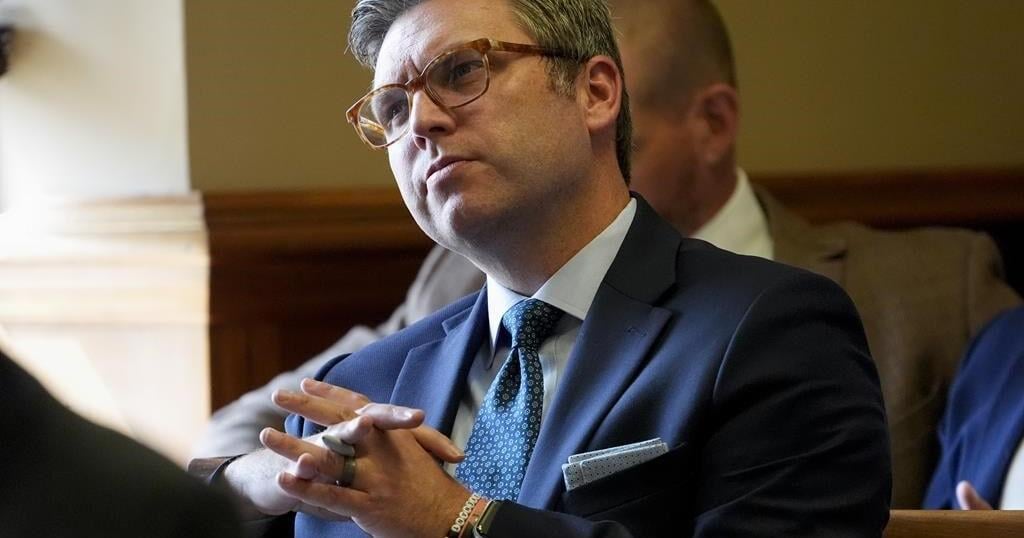NASHVILLE, Tenn. (AP) — Less than two months after the Southern Baptists’ policy arm issued an embarrassing retraction of an announcement of its leader’s firing, it gave him a strong vote of confidence this week — but with a caution against stirring unnecessary controversy.
Trustees for the Ethics & Religious Liberty Commission affirmed both their president, Brent Leatherwood, and the direction of the organization, which has long been on the vanguard of the religious right in voicing the conservative views of the nation’s largest Protestant denomination.
“We strongly affirm the ERLC under the leadership of Brent Leatherwood,” said incoming chair Scott Foshie. “The world and Southern Baptists need to hear that.”
His words echoed a formal statement issued by the trustees Wednesday after a lengthy closed-door session Tuesday. The statement acknowledged that, while the commission speaks out on numerous contentious issues where controversy is inevitable, that’s all the more reason not to stir up more controversy on nonessential issues.
Trustees acknowledged that support for the organization is wavering among individual churches, who fund almost all its budget. They supported the commission’s plan, already in the works, to create a new office to work more closely with pastors to help them better understand and guide the agency’s work.
“In a time of deep division in our culture, from polarization in our political environment, to falling trust in institutions, to the fracturing of families, the ERLC is needed now as much as ever both to serve in the public square,” the statement said.
But it urged the commission to be careful.
It said the staff needs to follow a companion set of guidelines, also issued Wednesday, which says the commission needs to base its public stances on the Bible as well as on the official faith statement and other resolutions approved by Southern Baptists at annual meetings in recent decades. The guidelines state that if advocacy on a particular issue is likely to “upset certain segments of the SBC,” the staff needs to evaluate the issue carefully — but may still speak out if it’s deemed essential.
The commission has staked out staunchly conservative stances on religious and political issues, with strong opposition to abortion and LGBTQ+ rights. Still, it has drawn the criticism of a vocal segment of the convention that wants to move the denomination even further to the right and sees it as drifting leftward.
Leatherwood has resisted calls to support the criminalization of women seeking abortion. He’s been criticized for supporting U.S. aid for Ukraine’s military defense and for supporting a Tennessee bill that would prevent access to firearms for people deemed a threat to others or themselves — an issue that is personal to Leatherwood after his children’s school was targeted in a deadly 2023 shooting.
Then in July, criticism erupted after Leatherwood issued a statement commending President Joe Biden for the “selfless act” of withdrawing from the presidential race after a dismal debate performance. Numerous voices in the Southern Baptist Convention, where overwhelmingly pro-Republican views prevail, denounced the statement, saying Biden acted not out of selflessness but out of political necessity.
Within a day, the commission’s chairman, Kevin Smith, moved to oust Leatherwood, and the agency issued a statement saying he had been removed. But after it emerged that Smith acted without a vote of the board’s executive committee, as required by bylaws, Smith resigned and the agency retracted its announcement.
Two members of the executive committee declined to comment on the episode in interviews, deferring to the agency’s strong statements in support of Leatherwood.
Even before that episode, Leatherwood recognized the problem of wavering support for the commission. At the Southern Baptists’ annual meeting in Indianapolis in June, church representatives voted down a proposal to abolish the commission entirely — but with a notable minority of voters supporting its abolition.
Those results “weren’t just disappointing, they were unacceptable,” Leatherwood said in an official address to the commission Tuesday.
“I say that not to the outrage artists and the grievance grifters who will never be on our side, who spin up political attack committees to come and throw bombs at us,” he said. “No, I’m talking to the local pastor and the everyday church member who just need to better understand our mission and the work that we do, and know that our work represents real Baptist leadership.”
He said the agency has already been taking such steps, surveying pastors and issuing lengthy guidebooks on issues they said were priorities, including election polarization and gender issues. It also issued a state-by-state guide to various abortion-related measures on November ballots.
“Our culture is not well right now,” Leatherwood said. Partisanship has been overwhelming “so many Christians,” he said. “Mistruths and conspiracy theories, they are everywhere right now.”
He urged Baptists to respond with gentleness and reason to such partisanship.
“The anxiety that people are feeling is real, but we help them understand it’s not supposed to be this way,” he said.
___
Associated Press religion coverage receives support through the AP’s collaboration with The Conversation US, with funding from Lilly Endowment Inc. The AP is solely responsible for this content.

























